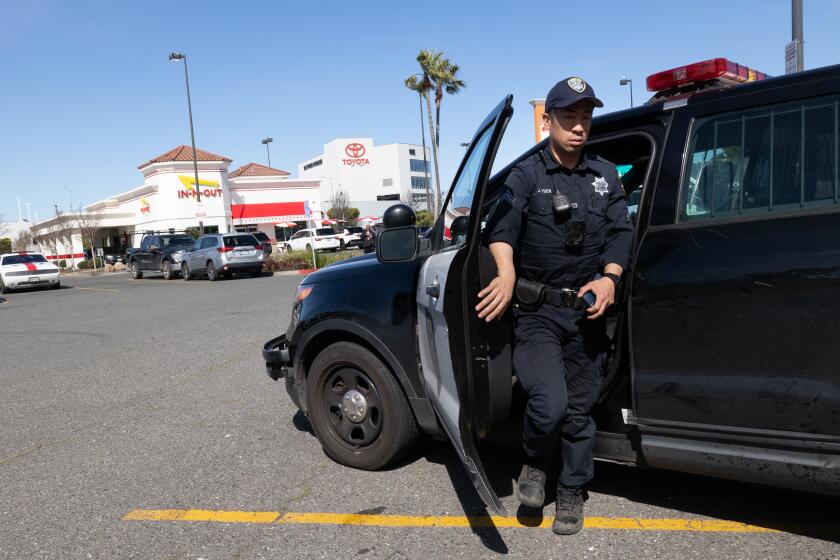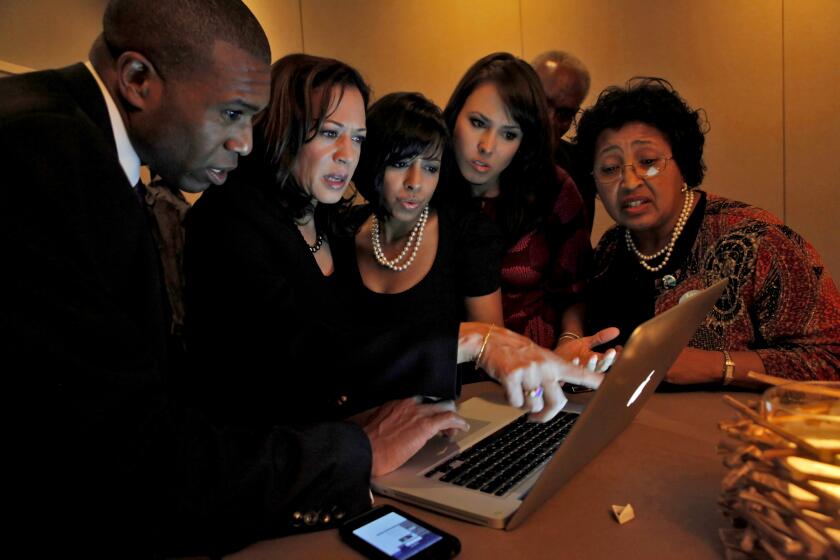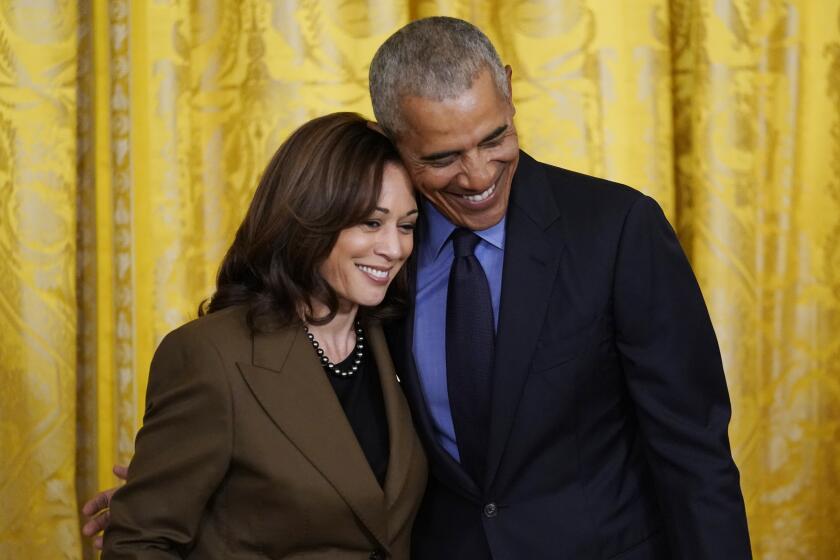One Latino Wins, 3 Others Lose in Watsonville Vote
Given a court-ordered chance to show their political strength, Latino voters added one member to the Watsonville City Council but lost another in a special election Tuesday that had been expected to foreshadow fundamental changes in local politics throughout California.
With most returns counted in this Salinas Valley town, the earthquake-delayed election seemed to fall short of serving as a test of assertions by civil rights activists that at-large elections unfairly hinder minority candidates and communities.
At-large elections are by far the most common method of electing city councils and school boards in California. But voting rights activists say that district elections--such as those conducted Tuesday in Watsonville--are fairer to minorities, and they have planned to sue to force district elections in dozens of other cities.
Latino activists here were encouraged that Oscar Rios, 39, was elected in a strong showing in one district. But Latinos in three other council races, including the council’s one Latino incumbent, Tony Campos, lost to Anglos.
Rios, a cannery union organizer, was a departure from the business-dominated, pro-growth council elected in previous at-large elections.
Voting rights activists had counted the Watsonville election as a victory even before the first ballot was cast. Just the fact that it occurred--and came at the order of a federal appeals court that found evidence of discrimination against minority voters--will make it easier to challenge election processes elsewhere in California, they believe.
Denise M. Hulett, a lawyer for the Mexican American Legal Defense and Educational Fund in San Francisco, said MALDEF alone plans to challenge at-large elections in several other California towns and cities early next year.
She said similar challenges also are being considered by the Southwest Voter Registration Project and two private civil rights lawyers, Joaquin G. Avila of Fremont and Barbara Phillips of San Francisco. Together, they formed the coalition that overturned the at-large election system in Watsonville.
“The face of local governments in the state is going to change forever,” Hulett said.
She declined to name specific cities being studied for court challenges next year. A survey conducted during the courtroom fight for district elections in Watsonville found more than 130 California cities that could be forced to change the way they choose council members. Each was found by the San Francisco law firm of Rosen & Phillips to have at-large elections, a Latino population of at least 10% and no Latino city council members.
Most of the cities were small- and medium-sized, although the list did include Fresno. San Francisco had district elections at the time of the survey, but since returned to at-large balloting for city supervisors and may now be required to switch back. Other large California cities, such as Los Angeles and San Diego, already vote by districts.
In total, about 95% of California’s 444 cities with city councils choose council members at large.
Voters in Salinas, not far from Watsonville, voted to start district elections for the City Council last year. Salinas City Manager Roy J. Herte said the city scrapped at-large elections to avoid a lawsuit it could not afford and probably could not win. In June, the seven-person Salinas City Council got its first Latino member.
Rios, an El Salvador-born labor organizer who enjoyed a 7-to-1 Latino registration advantage in his district, said the effect goes beyond those who are elected. He said it extends down to those who vote.
“Voters tell me, ‘Hey, this means something now; I have power,’ ” he said Tuesday while shaking hands outside the city library, one of 12 polling places in this earthquake-bruised but bustling farm town of nearly 30,000. “Why were the (Latino) voters so apathetic for so long? Because they never saw their candidates elected, never felt they could change anything. Now we are telling them they can elect people, can change things.”
The lawsuit challenging at-large elections in Watsonville was filed in 1985, when the city--then nearly half Latino--still had yet to elect its first Latino to city office in its 120-year history.
The suit alleged that voters in the city were racially polarized--that is, voted for candidates of their own or a similar ethnic background regardless of political philosophy. Since Anglo or non-Latino residents had an edge in voter registration, the suit alleged that they were able to effectively--and unfairly--shut out Latino candidates, and thus deny Latino voters fair representation.
As a result, during the 15 years immediately preceding the filing of the lawsuit, all nine Latino candidates who stood for office in Watsonville were defeated. The suit asserted that such election practices were outlawed by the Voting Rights Act of 1964.
“It’s not just a question of bad representation for Latinos; we are also talking about poor people in general--Latinos, Anglos, Filipinos, others,” Rios said. “They live mostly in these two council districts. Ask them if they ever saw a council candidate down here before now; they’d probably say they didn’t know the council existed.”
Nonetheless, U.S. District Judge William A. Ingram of San Jose rejected the suit in 1987, noting no overt discrimination by current city officials and asserting that the lack of success by Latino candidates was probably due to the low voter turnout by Latino voters in Watsonville.
Ironically, Campos was elected to the seven-member City Council a few months after Ingram’s ruling. Civil rights activists denied his success obviated their lawsuit, saying Campos, an affluent real-estate agent, did not represent the interests of most Watsonville Latinos, poor farm or cannery workers fighting to maintain the city’s stock of low-income housing in the face of developers’ plans for gentrification.
In any case, Ingram was overruled on appeal in July, 1988, by the U.S. 9th Circuit Court of Appeals, which said Ingram’s observations on low voter turnout were irrelevant to the question of the fairness of the system. The U.S. Supreme Court last March refused the city’s request to reinstate Ingram’s view, and a new election was ordered.
Originally, the election was to have been held Nov. 7, but was postponed a month after the October earthquake. The temblor damaged half of downtown Watsonville beyond repair, and hundreds of people remain camped in tents.
Rios said that the fact that almost all of the people still living in tents are Latino underscores the need for greater Latino representation in local government.
“The Bay Bridge has been fixed, and freeways are being fixed,” he said, “but nothing is happening here. People don’t like to hear that we are being treated as second-class citizens, but it’s a fact.”
More to Read
Sign up for Essential California
The most important California stories and recommendations in your inbox every morning.
You may occasionally receive promotional content from the Los Angeles Times.






